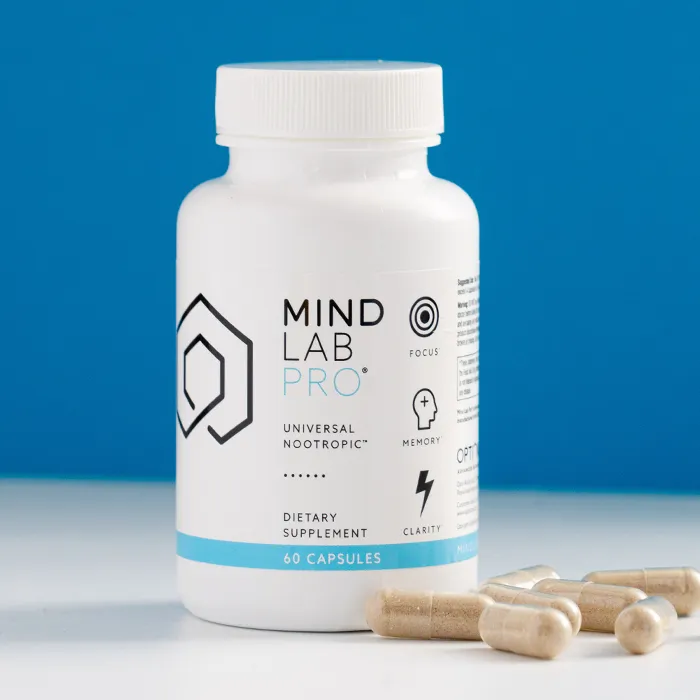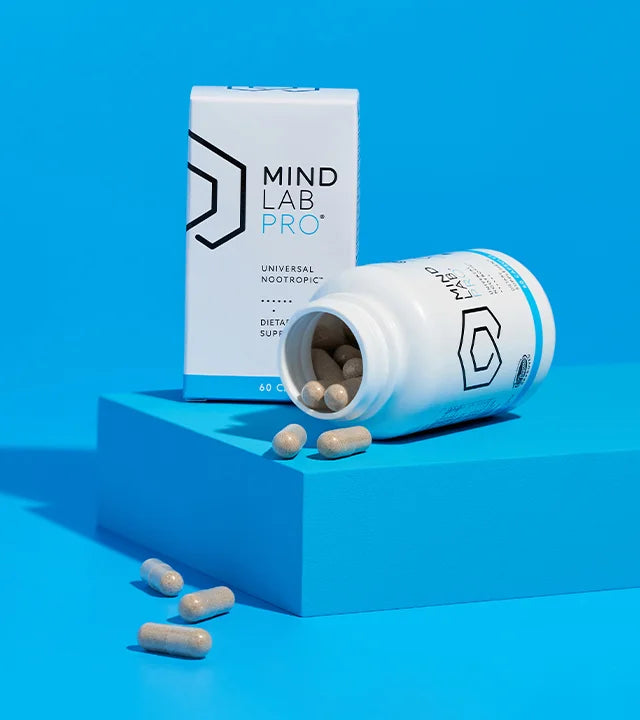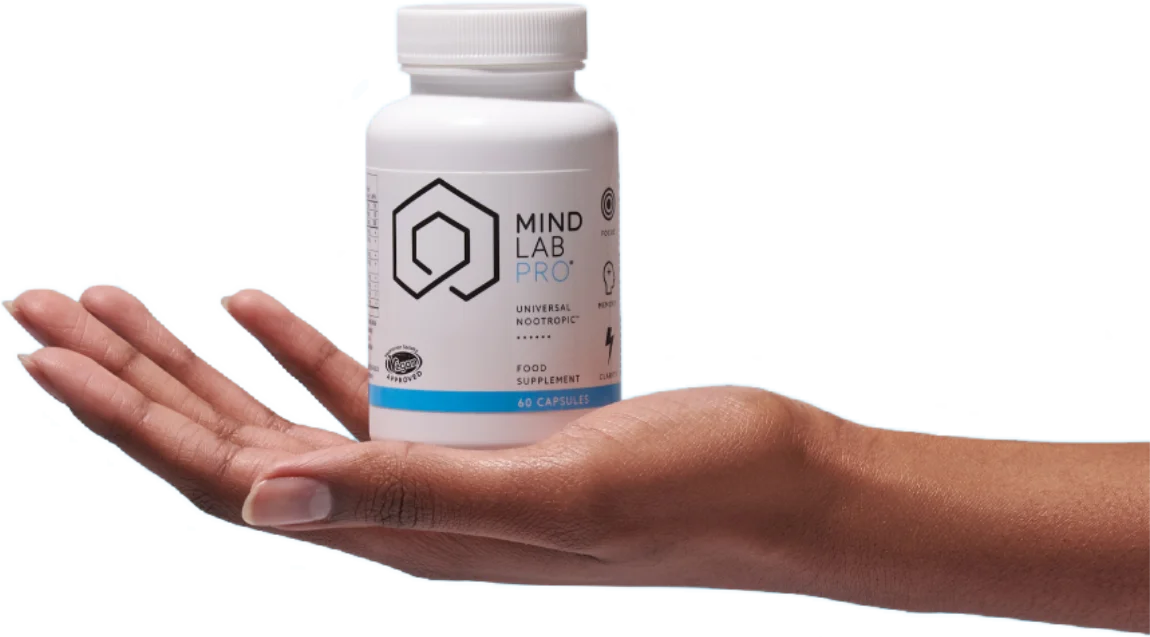You're a college student. Your brain’s on a deadline. Labs, late nights, and looming exams drain focus and recall—right when you need them most. Here’s how to study clearer, remember faster, and stay steady under pressure, without stimulants.
But you're also a family member, a friend, a group member, an employee.
Perhaps you're an athlete, and your daily juggle involves running at the gym in between running to class, the library, the cafeteria.
Then, you've still got to study.
More than any other group, college students face dynamic cognitive demands that leave them drained of brainpower -- just in time for exams.
If this sounds like you, consider nootropics for college students.
These natural supplement options enhance learning ability while improving brain health -- without the potential side effects and risks of synthetic stimulant options that so many college students seem to be taking.
This article discusses the best clean nootropics for competitive college students, and what academic advantages they may offer for learning, recall, stress-resistance, attention and more.
Key Takeaways
- Natural, stim-free nootropics can support learning, recall, attention, stress resilience, and study endurance.
- Core student ingredients: Citicoline (ACh & brain energy), Phosphatidylserine (memory), Bacopa (learning/recall), L-Theanine (calm focus), Rhodiola (anti-fatigue), Tyrosine/NALT (under stress).
- Timing matters: build benefits with consistent daily use; keep late dosing in check to protect sleep.
- Best results: stack smart + keep habits (sleep, hydration, spaced repetition) instead of chasing stimulants.
- Mind Lab Pro® combines 11 research-backed nootropics for everyday study blocks and exam performance.

Best Supplements for College Students in 2025: Mind Lab Pro®
Mind Lab Pro® (MLP®) is the top choice for students because it combines 11 premium nootropics for cognitive performance into one product. This formula is a whole-brain booster, so no matter what benefits a student is looking for -- memory, focus, relaxation, learning -- MLP may help. It has also shown mental performance benefits in well-designed clinical trials.
Study Guide: Nootropics in the Classroom
Due to an illegal rise in cognitive enhancing pills (sometimes called smart drugs) across modern academia, the subject of nootropics in the classroom may be somewhat touchy.
As we enter this brave new world of academic performance enhancement, one important question keeps surfacing: Are nootropics ethical, let alone legal or safe, for students to supplement nootropics?
The answer to this requires us to clear up two common misconceptions of nootropics...
Nootropics Do Not Increase IQ
As the movie Limitless suggested with the film's fictional NZT-48: the pill doesn't make you smarter, it only unlocks your full potential. Of course, while the film operates on a fictional, hyperbolic understanding of "human potential," true nootropics similarly do not synthesize new information in your head.
Nootropics Are Not Unnatural
If true nootropics are incapable of synthesizing new information, then neither are they able to transfigure the mind into a synthetically enhanced state like the synthetic cognitive enhancing pills circulating today's dorm rooms.
By the founder of nootropics Dr. Corneliu Giurgea's standards, for a substance to qualify as a nootropic it must be "
Rather nootropics optimize the brain's natural bio-pathways much in the same way that healthy sports nutrition optimizes an athlete's sports physiology.
 The doors of perception are not constructed but rather opened by nootropics.
The doors of perception are not constructed but rather opened by nootropics.Most nootropics on popular demand today are either extracted from natural sources or the natural source itself. It may surprise you to learn that one of the most popular nootropic stacks used by students today is simply caffeine stacked with L-theanine, a green tea amino acid.
However, in finding the right nootropics for college students, it's important to note how nootropics help college students and which nootropic associates with which brain health benefit.
How Might Nootropics Help College Students?
Brain health supplements may help college students in potentially innumerable ways, considering the diversity of both nootropic benefits and student cognitive demands. What one nootropic does for one student may not achieve the same effect with another.
With that in mind, a few key cognitive concerns seem pertinent to most, if not at all, students at various points in their academic career. Nootropics may alleviate those concerns by promoting the following:
Memory Consolidation
Despite how we often talk about it, "memory" doesn't encompass a single cognitive pathway. We have various modes of memory: long-term memory, short-term memory, working memory. However, when it comes to academic performance, the type of "memory" we're considering is the one that simply helps us learn, process, and recall new information.
And the brain chemical associated with that is neurotransmitter acetylcholine (ACh).
Cholinergic nootropics may assist with the brain's acetylcholine status via a few bio-pathways:
- Choline Donation - choline supplements supply raw precursor for ACh synthesis, as well as for phosphatidylcholine for neuronal membrane health.
- ACh Receptor Sensitivity - when ACh levels are fine but ACh expression is not, supplementing ACh receptor sharpening nootropics may help.
- Acetylcholinesterase Inhibition - reducing acetylcholinesterase, the synaptic enzyme responsible for ACh breakdown, may keep more ACh active.
 Acetylcholinesterase mechanism for acetylcholine breakdown.
Acetylcholinesterase mechanism for acetylcholine breakdown.Stress Reduction
While often used to describe subjective or emotional discomfort, the term "stress" may take on any number of meanings and manifestations, including:
- Psychological - the mental experience of feeling "overwhelmed" or anxious.
- Chemical - oxidative stress, harmful digestive reactions, etc.
- Temperature - extremely high or low temperature exposures to the body.
As a physiological measurement, "stress" stands synonymous with stress hormone cortisol, the hormone released from the kidneys during various conditions of stress. If left unchecked, the hormone stress response may negatively impact physical and mental performance, leading to harsh health conditions down the road.
Some nootropics may help ameliorate stress by either regulating stress response activation or mitigating the impact of an over-activated stress response.
Attention Enhancement
Many attention disorders are first observed and diagnosed in the classroom. This makes sense, given that your duty as a student is essentially to pay attention. Some students have an exceptional hard time with paying attention, and one hypothesis points to catecholamine imbalance as the culprit.(2) Catecholamine neurotransmitters include:
- Dopamine - drives motivation and the pleasure-reward pathway.
- Norepinephrine - regulates vigilance, attention, and sleep-wake cycles.
- Epinephrine - stimulates the brain and body under stress.
Attention, working memory, impulse control -- these executive functions correlate with the brain's catecholamine status. Naturally, under conditions of stress and sleep deprivation, catecholamine levels tank. Which is why catecholaminergic nootropics become particularly useful during finals week.
Behavior Tips for Better Academic Performance
Nootropics work best on a solid mental foundation. While considering nootropics, consider also adopting the following academic lifestyle routines:
1. Cardio Exercise
The evidence is there: a quick 30-minute aerobic workout may contribute to an immediate spike in working memory capacity. Bear in mind that the study that observed this found an increase in working memory with aerobic exercise but not resistance training.
2. High-Fat Diet
Not burgers and fries. Try adding foods high in polyunsaturated fats -- e.g., Omega-3 and Omega-6 -- to your diet. Research suggests that a polyunsaturated fatty acid mixture may improve behavior detriments associated with test anxiety -- i.e., appetite, mood, concentration, fatigue, organization, and stress.
3. Regular Sleep Cycle
We get it: eight hours of sleep every night is asking for quite a bit from the success-oriented student. While we don't need to tell you that sleep duration strongly correlates with test performance, our recommendation is to simply shoot for a consistent wake-up cycle. Cortisol spikes upon waking, and thus activating that spike on a timely schedule may keep your 24-hour cortisol levels balanced.
The Academic Benefits of Nootropics

The only way to get the good grades is to study. There's no short-cut around that. Yet, even the most avid students falter, especially when the course load piles up. But that road may certainly become easier by focusing on the above brain bio-pathways: Cholinergic Status, Stress Reduction, and Catecholamine Levels.
Optimizing these cognitive pathways may lead to better:
- Focus- the ability to truly watch and listen amidst distractions or boredom.
- Memory - the process from learning to recalling new information.
- Energy- even mental hard work requires an efficient fuel reserve system.
- Mood- a positive attitude does open doors, academic and otherwise.
- Motivation- the potential of a healthy mind is achieved by motivation.
But not one nootropic may deliver on all of these benefits. For best results, it's key for college students to adopt a diverse nootropic stack -- a multi-ingredient strategy for a synergy of nootropic results. And, of course, to stack only high quality, effective nootropics. Let's check out a few examples.
This has been drastically beneficial for me as a university student, especially since I used to need naps or long breaks to recover.Elias G.

Mind Lab Pro® Nootropics for College Students
Bacopa Monnieri

Widely researched and highly valued for its versatile brain benefits, Bacopa monnieri is an ancient Ayurvedic herbal adaptogen perhaps best known for its cholinergic memory enhancement effects. While some nootropic enthusiasts supplement Bacopa for its stress adaptive benefits, this brain botanical holds a special place in students' hearts (and brains) as a learning accelerator and exam performance-enhancer. The research behind this reputation:
- Chronic Bacopa supplementation has been shown to improve "higher order cognitive processes that are critically dependent on the input of information from our environment such as learning and memory."(3)
Quality Bacopa monnieri extracts include at least 20% bio-active bacosides A and B; however, Mind Lab Pro® Bacopa Extract supplies a full spectrum of 9 bacosides most associated with the herb's full nootropic potential.
More on Mind Lab Pro® Bacopa Monnieri
Citicoline

Often referred to as a brain energizer, Citicoline charges brainpower via several significant bio-pathways. Citicoline's nootropic versatility may be attributed to the nootropic's two bound constituents:
- Choline - precursor to acetylcholine and phosphatidylcholine.
- Cytidine - precursor to uridine, a synapse enhancing nucleotide.
By simultaneously increasing synaptic plasticity and the brain cholinergic status, Citicoline seems to essentially "re-fuel" the brain's capacity to think, learn, and remember. Potentially synergizing with Bacopa's cholinergic activity.
Cognizin® Citicoline in Mind Lab Pro® has been shown to improve working memory and overall enhanced brain activation among healthy adults.
More on Mind Lab Pro® Citicoline
N-Acetyl L-Tyrosine

For the stressed out, sleep-deprived college student (i.e., every college student), L-Tyrosine is a must-have nootropic. During physically and mentally stressful conditions, the brain burns through catecholamine neurotransmitters -- dopamine, norepinephrine, epinephrine, etc. -- to maintain high levels of focus, concentration, and energy. Once those chemicals drop, so does cognition.
L-Tyrosine, best supplemented as N-Acetyl L-Tyrosine, converts to catecholamines, replenishing the brain's ability to think under pressure.(4) As such, L-Tyrosine makes for a prime "exam day" cognitive enhancer.
More on Mind Lab Pro® N-Acetyl L-Tyrosine
The Pre-Exam "All-Nighter" Nootropic: N-Acetyl L-Tyrosine
Ironically, one of the worst things a student can do prior to a huge, important exam is also one of the more common pre-exam rituals: The All-Nighter.
For obvious reasons, operating on 24+ hours of no sleep has its negative repercussions on cognitive and physical performance. However, the average student need not wait for the pre-exam "all-nighter" to experience the negative effects of sleep deprivation, as most students operate on sub-optimal sleep levels at all times. And the cognitive downside to habitually sub-optimal sleep?
- Poor Memory Consolidation
- Impaired Attention and Working Memory
- Low Vigilance
- Poor Decision-Making
While sleep-deficiency may negatively impact a student's academic performance, the condition may also take a toll on a student's extracurricular activities, such as exercise and peer socialization. For long-term sleep-deficiency, the best solution: Get some sleep.
For the occasional, inevitable pre-exam "all-nighter", students may maintain sharp testing skills by supplementing with the natural nootropic N-Acetyl L-Tyrosine.
As one placebo-controlled study demonstrated, L-tyrosine supplementation helped counteract test performance impairments influenced by one night's sleep loss, lasting on the order of three hours. So, if you're willing to invest a night off of sleep on tomorrow's exam, might as well invest a little further in some L-tyrosine damage control.
Rhodiola Rosea

Similar to L-Tyrosine, Rhodiola Rosea helps acutely bolster the mind against stress and tiredness. Viewed as one of the most effective natural performance enhancers, particularly among bodybuilders, Rhodiola seems to better qualify as a poor performance inhibitor -- thanks in large part to the herb's inhibitory effects on stress hormone cortisol and fatigue. It helps maintain academic performance with calming effects and mind-sharpening benefits.
While a single dose of Rhodiola has been shown to boost mental and physical performance for up to 4-6 hours, this nootropic plant may be regularly consumed for everyday enhancement.
More on Mind Lab Pro® Rhodiola Rosea
L-Theanine

Most college-aged caffeine consumers opt for coffee over green tea. From a nootropic standpoint, this is unfortunate, as the coffee drinkers miss out on a key tea amino brain booster: L-Theanine.
Taken in supplement form, L-Theanine puts the brain in a uniquely "relaxed, yet wakeful" brain state measured on the EEG scale as alpha brainwaves. Many students and thinkers like to stack L-Theanine with a caffeine source -- usually coffee -- to reduce the jittery side effects of caffeine while sustaining its stimulatory benefits. The result is a calm, collected, anxiolytic burst of focus and energy.(5)
Did you know? In addition to supporting younger populations, L-Theanine has shown some potential to help with age-related cognitive decline and mild cognitive impairment.
Maritime Pine Bark Extract

Due to a richly powerful and potent antioxidant complex, Maritime Pine Bark Extract seems to affect a variety of neuroprotective brain benefits, most notably the maintenance of catecholaminergic neurotransmitters -- e.g., dopamine and norepinephrine. As such, Maritime Pine Bark Extract may hold potential to help attention, concentration, and hyperactivity otherwise impaired by a low catecholamine status.
For the tuition paying college student, it almost literally pays to pay attention. Maritime Pine Bark Extract may help.
More on Mind Lab Pro® Maritime Pine Bark Extract
Best Brain Supplements for Students in 2025
Mind Lab Pro®

Mind Lab Pro® (MLP) is considered a "Universal Nootropic" brain supplement because it is designed to support brain health and enhance overall cognitive performance. This means it can help a student's brain to fire on all cylinders, with sharper focus, attention, memory and clarity. It also means MLP can help with mood and stress, both of which can have a big impact on academic performance.
The MLP Formula: Citicoline (CDP Choline) dosage 250mg per serving, Phosphatidylserine (PS) 100mg (from sunflower lecithin), Bacopa monnieri 150mg (24% bacosides, 9 bioactives), Organic Lion's Mane Mushroom 500mg (fruit and mycelium), Maritime Pine Bark Extract 75mg (Standardized to 95% proanthocyanidins), N-Acetyl L-Tyrosine 175mg, L-Theanine 100mg per serving, Rhodiola rosea 50mg (Standardized to 3% rosavins and 1% salidrosides), NutriGenesis® Vitamin B6 (2.5 mg), Vitamin B9 (100 mcg), Vitamin B12 (7.5 mcg)
MLP® also leads the best supplements for college students because it is backed by research.
Specifically, two double-blind, placebo-controlled human research trials conducted at the University of Leeds have demonstrated its benefits for information processing and several aspects of memory.(6,7).
Ready to study clearer and perform steadier, without the crash?
Additional supplements for students to consider:
- Caffeine 2: Way better than coffee or caffeine pills. This supplement enhances caffeine with nootropics, including L-Theanine, for clean energy with fewer jitters and crashes. Learn More
- Performance Lab® Energy: Caffeine-free energy that works on a cellular level. Perfect for revitalizing the brain without relying on stimulation. Learn More
- Performance Lab® Omega-3: Supplies DHA (docosahexaenoic acid), the primary Omega-3 associated with mood support and overall brain health. Learn More
FINAL THOUGHTS
Supplements for students offer a natural way to nourish brain cells, enhance cognitive function, improve focus, and support mental clarity during demanding study sessions. These cognitive enhancers can help boost memory retention, learning capacity, and overall brain performance, making them ideal for students looking to maximize academic success.
Not all students are equal. As the Universal Nootropic™, Mind Lab Pro® targets various brain pathways for 100% Brainpower optimization, improving your competitive collegiate potential -- whether you're studying English or engineering.

References
- Giurgea C, Salama M. Nootropic drugs. Progress in Neuro-Psychopharmacology. 1977; 1(3-4): 235-247.
- Prince J. Catecholamine dysfunction in attention-deficit/hyperactivity disorder: an update. J Clin Psychopharmacol. 2008 Jun;28(3 Suppl 2):S39-45.
- Stough C et al.The chronic effects of an extract of Bacopa monniera (Brahmi) on cognitive function in healthy human subjects. Psychopharmacology (Berl). 2001 Aug; 156(4): 481-4.
- Neri, DF, Wiegmann D, Stanny RR, Shappell, SA, McCardie A, McKay, DL. The effects of tyrosine on cognitive performance during extended wakefulness. Aviat Space Environ Med. 1995 Apr;66(4):313-9
- Nobre AC, et al. L-theanine, a natural constituent in tea, and its effect on mental state. Asia Pacific Journal of Clinical Nutrition, 01/2008; 17 Suppl 1:167-8.
- Utley A, Gonzalez Y, Imboden CA. The Efficacy of A Nootropic Supplement on Information Processing in Adults: A Double Blind, Placebo Controlled Study. Biomed J Sci & Tech Res 49(1)-2023. BJSTR. MS.ID.007746
- Abbott-Imboden C., Gonzalez Y., Utley A. (2023). Efficacy of the nootropic supplement Mind Lab Pro on memory in adults: Double blind, placebo-controlled study. Human Psychopharmacology: Clinical and Experimental, e2872. https://doi.org/10.1002/hup.2872

